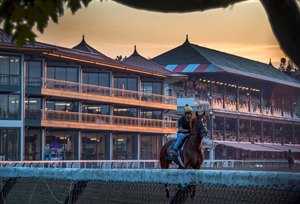OwnerView Conference: Buying and Owning Racehorses


The eighth Thoroughbred OwnerView National Owners Conference, held by The Jockey Club and Thoroughbred Owners and Breeders Association, opened with panels addressing the fundamentals of Thoroughbred ownership: buying and owning horses.
Held for the first time in Saratoga Springs, the two-day event began July 25 with seven owners and buyers discussing their experiences acquiring and racing horses.
The conference was held in the 1863 Club at Saratoga Race Course, and retired race caller Tom Durkin greeted the several hundred attendees with an overview of the history and architectural evolution of the track. He noted that the 1863 Club, which opened in 2019, initially faced pushback from those who saw it as an unnecessary modern addition to the historic facility before being embraced by Saratoga's customers.
Tony Allevato, president of NYRA Bets and chief revenue officer for the New York Racing Association, continued the theme, saying that "attachment to tradition blinds us from making change."
"In addition to a shortage of horses," he said, "we also have a shortage of owners, and as (a racetrack operator), we need to make the ownership experience as good as possible."
Part of improving that ownership experience is education for new and veteran owners, both of which were in the audience. Moderating the first session was industry veteran Carolyn Conley, who asked three owners and buyers about their strategies for evaluating horses at auctions.
Bloodstock agent Jacob West; Tom Gallo, founder and managing owner of Dream Maker Racing and the Thomas J. Gallo III Sales Agency; and Terry Finley, president and CEO of West Point Thoroughbreds, offered a variety of perspectives on the experience, highlighting their different approaches.

West said that he pays little attention to pedigree, preferring instead to focus on a horse's physical and athletic attributes, while Gallo said that a horse's bloodlines are the first things he looks at.
"I'm looking for a proven mare and a proven stallion," Gallo said. "I'll rarely buy a horse by an unproven stallion and rarely out of an unproven mare and never a combination of unproven parents."
With a relatively low budget of about $250,000, though, Gallo can't chase yearlings by top stallions out of stakes-winning mares.
"I'm looking for meat and potatoes stallions, the ones who produce solid competitors," he said. "You can find good stallions that are in kind of a quiet time, when their stud fee goes down."
West agreed, citing the appeal of "warhorse stallions."

"They're tried and true but not so sexy in the sales ring. That doesn't make a lot of sense to me," West said. "Ours is a 'what have you done for me lately?' game, and with that recency bias, you've got people who can remember seeing a certain stallion on the track and you see their babies, and people can gravitate towards that and forget about horses that retired 12 or 15 years ago."
The second session focused on ownership, particularly from the perspective of partnerships. Moderator Acacia Courtney Clement, on-air analyst for NYRA, asked panelists Tina Bond, Joe Appelbaum, Don Little Jr., and Jack Knowlton about their experiences, including their business plans, the value of fractional ownership, and maintenance/training costs.
The panelists represented a variety of ownership models. Bond and her husband, trainer Jim, formed Bond Racing Stable when COVID-19 disrupted the sales plans for horses they had bred. They retain 50% ownership of any horses they purchase or breed.
Appelbaum and a small group of friends have been an essentially stable partnership for the last couple of decades, racing as Off The Hook. Little's Centennial Farms has existed for 40 years and continues to actively recruit new owners. Knowlton's Sackatoga Stable began as a group of high school friends and now includes owners from 13 states.
Sackatoga buys exclusively New York-breds, while Centennial focuses on purchasing colts that will develop into successful enough racehorses to become stallions. Identifying that focus–whether it's on claiming horses, homebreds, or yearlings, is critical to any stable's success, the panelists said.
"This is a game with a lot of difficult decisions," said Appelbaum, who co-founded Off The Hook, a buying, pinhooking, and racing entity. Appelbaum is also the president of the New York Thoroughbred Horsemen's Association. "You have to decide what to buy, whom to fire, where to race. When you have a plan, those decisions are easier."

Like the buyers on the earlier panel, these owners also brought differing opinions on stallions. Sackatoga Stables' two biggest successes, Funny Cide (Distorted Humor ) and Tiz the Law (Constitution ), were by first-crop sires.
"We're all in on first crops," said Knowlton. "And when Tiz the Law's first foals come to auction next year, we'll be bullish on that again."
Little added: "We bought stakes winners from the first crops of Danzig, Fappiano, and Private Account. We helped make those stallions."
Appelbaum disagreed.
"I never buy from first-crop sires," he said. "You pay a premium price for them."
He pointed out that several years ago he purchased a $20,000 New York-bred yearling by Mucho Macho Man .
"He danced every dance," Appelbaum said of the stallion. "He didn't have much pedigree, but his stallion career was very successful from the perspective of production numbers. He wasn't so successful commercially. That's an opportunity for you as a buyer, to buy from a sire that can produce on the racetrack. He was producing at the level of a $50,000 stallion, so why pay $50,000 when you can pay $12,500?"
Appelbaum pinhooked that weanling to Dean Reeves, who owned Mucho Macho Man, for $185,000. Named City Man , he's a graded stakes winner who has earned $653,050 and captured the July 15 Forbidden Apple Stakes (G3T) at Saratoga.
"I look for value," Appelbaum said. "I want to stay in the game for as long as possible."
